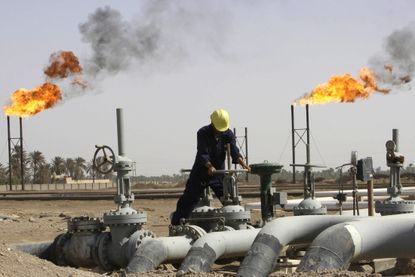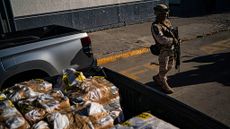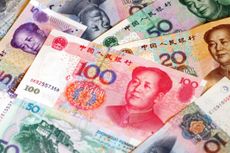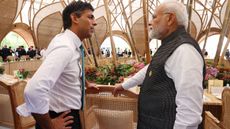Why Iraq rules OPEC now
Meet the new top dog in the oil market


OPEC is at it again.
Earlier this year, the 14-member Organization of the Petroleum Exporting Countries dangled the possibility of a production freeze to contain the global glut of oil that's been driving down prices. But the proposal fell apart in April, when Iran couldn't be brought on board and Saudi Arabia refused to move without them.
Fast forward to this Wednesday, and OPEC appeared to finally strike a deal: They'll cut their total production to somewhere between 32.5 and 33 million barrels per day (bpd), down from the 33.24 million they're at now.
Subscribe to The Week
Escape your echo chamber. Get the facts behind the news, plus analysis from multiple perspectives.

Sign up for The Week's Free Newsletters
From our morning news briefing to a weekly Good News Newsletter, get the best of The Week delivered directly to your inbox.
From our morning news briefing to a weekly Good News Newsletter, get the best of The Week delivered directly to your inbox.
Or at least that's what OPEC says it'll do. Wednesday's real significance may lie in what it says about OPEC's internal politics: Both the newfound cooperation between Saudi Arabia and Iran, but also the rise of Iraq. That latter country lapped Iran a few years ago as OPEC's second-biggest producer, but it waited until Wednesday to really throw its weight around.
Iran caught an economic break recently, when the recent nuclear deal with the U.S lifted sanctions. The country's oil production shot back up to 3.6 million bpd, on track to the 4 million it enjoyed before the sanctions started. As Iran has approached that target, it's become more willing to play ball with Saudi Arabia.
But Iraq's production has also been rocketing up recently; it's already at 4.7 million bpd, and looking to hit 5 million soon. It was Iraq that set the stage for Wednesday's decision by offering the other members its proposed production cap earlier this month, apparently concluding that circumstances had changed enough from April to make a deal worthwhile.
It was also Iraq that forced the rest of the members to accept the 32.5-to-33 million bpd range rather than a hard 32.5 million bpd ceiling. Their big reason is that they think OPEC's estimates of their production levels — upon which the initial ceiling proposal was based — are too low.
In fact, some of the media outfits that cover the global oil industry, like Argus Media, provide the data that OPEC uses for its estimates. And on Wednesday, Iraq's new oil minister Jabar Ali al-Luaibi went so far as to denounce Argus Media's reporting on their production, demand that they reveal their sources, and then threaten the outfit if its reporting didn't start molding to Iraq's liking. "Your sources are not acceptable. And if there is deviation from the government, then Argus will not work in Iraq," Luaibi told an Argus reporter — apparently doing so with the backing of Falah Alamri, Iraq's governor to OPEC.
It was a breathtaking level of chutzpah, made all the more remarkable for the deal Saudi Arabia is accepting. A few months ago, the kingdom was insisting everyone in OPEC would have to cut production for a deal to go through. Now, they're still decreasing their own oil output down to 10.2 million bpd from 10.7 million, while Iraq will get some wiggle room due to the range in the ceiling. It also sounds like, thanks to the way the numbers add up, Iran may be essentially exempted from the need to cut production — though Iranian Oil Minister Bijan Zanganeh suggested his country may scale back anyway, by about 700,000 bpd. And along with Iran, Nigeria and Libya will be permitted to produce "at maximum levels that make sense."
All of this also occurs in the broader context of OPEC's declining power. Back in the 1970s — when it cut off oil production over Western support for Israel, throwing the American economy into a panic — OPEC was producing 50 to 55 percent of the world's oil supply. Even at the peak of the embargo, its share of annual global production never really got below 30 percent. As of 2014, OPEC was producing 39 percent of the world's oil supply. OPEC just doesn't have the leverage it once did over the global market.
As a result, these reductions won't be nearly enough to seriously move the needle on global oil prices. There may be more demand than supply globally by the end of the year, but it's going to have to stay that way for a long time to drain off the oil glut and lower prices. Which is probably why oil prices jumped 5 percent with the news, but still only reached $47.50, and then quickly fell back. "This is not a game-changer for the oil markets," Julian Jessop, the head global economist at Capital Economics, told CNNMoney. "The agreed cut is small and from an already high level [of production]."
That, in turn, probably explains why OPEC members themselves were emphasizing the political positives: that this is the first deal they've managed to reach in eight years, and the first ceiling they've imposed since the last ceiling was abandoned two-and-a-half years ago. "In the recent past, we had two of our founder members who were at war," OPEC Secretary General Mohammad Barkindo also told CNNMoney. "I was really impressed with the way they just focused on the fundamentals and came to this historic decision."
Which, of course, assumes the deal sticks. Analysts still want to see hard numbers on who will reduce by what amount, all of which won't be finalized until the next formal meeting in November. At that point, it will also be up in the air whether major non-OPEC oil producers like Russia decide to play ball. OPEC's members are all fighting over a shrinking pie of global economic influence. And given that Saudi Arabia has suddenly found itself playing second fiddle, that Iran still wants to reclaim its pre-sanctions oil-producing glory, and that Iraq feels emboldened to set its own capricious terms, the whole thing could still easily unravel. If those aforementioned OPEC estimates of Iraqi output don't change by the November meeting, "then we say we cannot accept this, and we will ask for alternatives," Luaibi told reporters.
"I don't think that what we have is a deal," Jaafar Altaie, the managing director at consultants Manaar Energy Group, told Bloomberg. "What we have is rhetoric alluding to a deal that gives breathing room for prices to rise and for OPEC to decide on the terms of its agreement and how to put it into place."
One of Reuters' OPEC sources was far more blunt: "The deal is a bit of a farce," they said.
Create an account with the same email registered to your subscription to unlock access.
Sign up for Today's Best Articles in your inbox
A free daily email with the biggest news stories of the day – and the best features from TheWeek.com
Jeff Spross was the economics and business correspondent at TheWeek.com. He was previously a reporter at ThinkProgress.
-
 'Make legal immigration a more plausible option'
'Make legal immigration a more plausible option'Instant Opinion Opinion, comment and editorials of the day
By Harold Maass, The Week US Published
-
 LA-to-Las Vegas high-speed rail line breaks ground
LA-to-Las Vegas high-speed rail line breaks groundSpeed Read The railway will be ready as soon as 2028
By Peter Weber, The Week US Published
-
 Israel's military intelligence chief resigns
Israel's military intelligence chief resignsSpeed Read Maj. Gen. Aharon Haliva is the first leader to quit for failing to prevent the Hamas attack in October
By Justin Klawans, The Week US Published
-
 Geopolitics and the economy in 2024
Geopolitics and the economy in 2024Talking Point The West is banking on a year of falling inflation. Don't rule out a shock
By The Week UK Published
-
 US-led price cap on Russian oil 'almost completely circumvented'
US-led price cap on Russian oil 'almost completely circumvented'Speed Read 'Almost none' of seaborne crude oil from Moscow stayed below $60 per barrel limit imposed by G7 and EU last year
By Harriet Marsden, The Week UK Published
-
 Mexico's Sinaloa cartel bans fentanyl, reportedly under pain of death
Mexico's Sinaloa cartel bans fentanyl, reportedly under pain of deathSpeed Read The top exporter of fentanyl to the U.S. is apparently looking to diversify as law enforcement turns up the heat
By Peter Weber, The Week US Published
-
 The threat posed by bonds to the global financial system
The threat posed by bonds to the global financial systemUnder The Radar The worst bear market in a century is unleashing huge strain on parts of the financial system
By The Week Staff Published
-
 China: a superpower’s slump
China: a superpower’s slumpThe Explainer After 40 years of explosive growth, China’s economy is now in deep distress — with no turnaround in sight
By The Week Staff Published
-
 Are Western sanctions working on Russia’s growing economy?
Are Western sanctions working on Russia’s growing economy?Today's Big Question IMF forecasts Russian growth but one expert says the West must be patient in bid to deter Putin
By Arion McNicoll Published
-
 South Africa’s energy crisis explained
South Africa’s energy crisis explainedfeature Electricity blackouts lead to rising crime and economic hardship and add to pressure on ANC
By The Week Staff Published
-
 India’s geopolitical aspirations in 2023
India’s geopolitical aspirations in 2023feature The emerging Asian superpower is showing ‘growing confidence’ on the world stage
By Chas Newkey-Burden Published